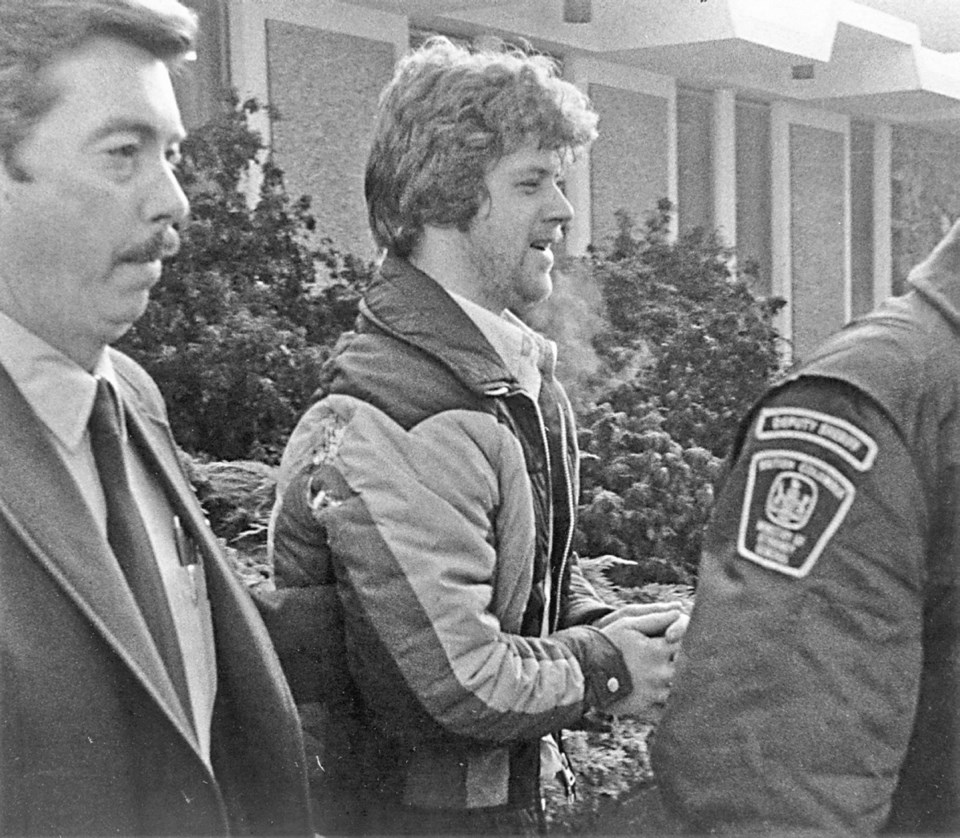A federal inmate who murdered one young woman and left another to die has been granted a 60-day unescorted temporary absence to attend an Aboriginal day healing program.
The Parole Board of Canada granted Kelly Toop’s request to attend the program to address his issues with substance abuse and childhood trauma.
At the same hearing on July 24, the parole board denied Toop’s request for unescorted temporary absences to spend time with his wife, citing concerns about his risk for future sexual violence in an unsupervised setting.
Toop, 59, is serving a life sentence for the 1980 first-degree murder of Suzanne Seto, a 29-year-old Vancouver real estate appraiser, in Duncan. The parole board heard that at the time of the murder, Toop was unemployed, broke and depressed.
On June 2, 1980, after drinking at a bar, Toop broke into Seto’s hotel room through an unlocked window.
He confronted her and sexually assaulted her for more than three hours.
Toop took her to a nearby wooded area, hit her on the head with a concrete block and left.
Her body was found the next day.
Toop was also convicted of attempted murder, rape and acts of gross indecency. The parole board heard that in November 1982, Toop asked a young woman for a ride.
Along the way, he asked her to stop, claiming he wanted to get out.
Toop hit the woman about the head and face and sexually assaulted her three times. He took her to his parents’ house and sexually assaulted her for several hours.
Toop bound her wrists with rope and went to sleep. When he awoke, he drove her to a gravel pit and hit the young woman over the head, then left her in sub-zero temperatures, believing she was dead.
She was found a short time later. Due to her injuries, she was unable to speak.
Toop was arrested in November 1982 and confessed to the 1980 murder at that time.
A victim impact statement from Toop’s second victim described the lifelong and enduring harm she continues to experience as a result of his “savage actions against” her.
“The board remains ever mindful of the nature and gravity of the index offences,” the parole board’s decision says. “Your offences involved sadistic and degrading acts of violence committed for your own sexual gratification. You murdered a young woman and left another young woman to die.”
In granting the 60-day unescorted temporary absence, the parole board considered Toop’s social history, which includes early childhood physical abuse at the hands of his father as a means of discipline. Toop was also coerced into sex with an older boy when he was 10. The older boy introduced him to pornography and would beat him. Toop turned to substances to cope with his emotions and the trauma.
Toop has been assessed at moderate to high risk to reoffend both sexually and violently. A 2019 psychological assessment said it is unclear whether Toop’s risk of sexual offending can be managed in an unsupervised setting.
“In the psychologist’s opinion, your risk for violent and sexual reoffending remains high,” the decision says.
The board found Toop continues to hold significant anti-authority attitudes. However, a recent correctional programming report found he displayed a positive attitude and had gained and demonstrated considerable insight into his crimes. Previous reports found he had a poor attitude, lacked accountability and insisted his offences were not sexually driven.
“The 2018/2019 report is the first indication of a notable change or shift in any insight or understanding you have into your risk factors and sexual deviance,” the decision says.
The parole board believes Toop has yet to fully explore or examine the full scope of his deviant sexual behaviours.
Toop will be transported to the trauma program by correctional staff. The program is a 10-minute drive from the prison where he is being held. The parole board was unable to disclose Toop’s penitentiary.
The parole board concluded that Aboriginal culture, ceremony and traditions are an important part of Toop’s life.
“The Board finds it desirable for you to leave the institution for the [unescorted temporary absence] so you can begin to attend to your history of substance abuse and trauma. The Board also finds this is an important aspect of addressing outstanding areas of risk ... The [unescorted temporary absence] reflects a first step toward a safe and gradual reintegration process,” says the decision.
Toop is not to consume, purchase or possess alcohol or drugs during the 60 days and must have no contact with the victim or any member of the victims’ families, with the exception of Robert Seto, who participated in a restorative justice program.
Toop must not go to Vancouver or Williams Lake. He must follow the treatment plan arranged by his parole supervisor and must not possess pornography or sexually explicit material.



